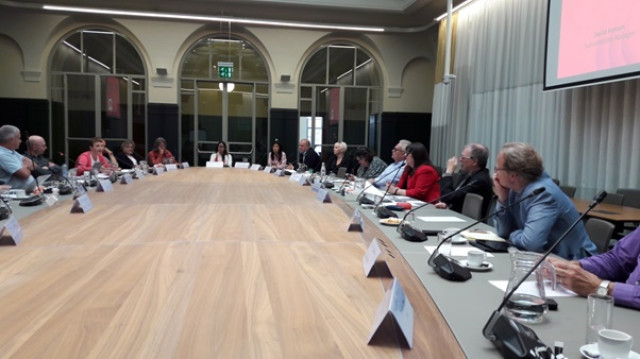TEXTILES 2030
a new voluntary industry sector agreement for sustainable clothing and household textiles in the UK

The Waste and Resource Action Programme (WRAP) has announced a new UK voluntary industry sector agreement for sustainable textiles. ‘Textiles 2030’ will be the most ambitious national voluntary agreement for clothing and other textiles in the world. The ten-year programme aims to transform UK clothing and home fabrics to reduce their impact on climate change. It will take the UK from a make-use-dispose culture to a circular one where goods are produced sustainably, used longer, and then re-used or recycled into new products.
Central to the new agreement is a Target-Measure-Act approach, which requires clothing and textile businesses to set targets, measure their impact and track progress on both an individual business basis, and towards national targets and public reporting. Targets and actions are planned around design for rcyclability/durability, longer product life through reuse and recycled content in products, In this way, Textiles 2030 is aiming to reduce lifecycle GHG emissions in line with the global goal of a 1.5°C trajectory, cut the water footprint of products and deliver a UK-wide circular textiles road map.
The British Retail Consortium (BRC), British Heart Foundation, Cancer Research UK, Charity Retail Association, CTR Group, John Lewis Partnership, Oxfam, Primark, Recyclatex, Sainsbury’s, Salvation Army Trading Company, SOEX UK, Suez, Ted Baker London, Tesco and the Textiles Recycling Association (TRA) are the first organisations to sign up to Textiles 2030, ahead of its official launch in April 2021.
The UK’s Environment Minister Rebecca Pow said: “We must shift away from a ‘take, make, use, throw’ approach to a more circular system where clothes are kept in use and re-used, recycled fibres are used in new products and the climate and water impacts of the sector are reduced. Textiles 2030 will help drive this transformation, to shift to greater circularity and innovation in the UK and help in our mission to build back greener from the Covid pandemic.” The announcement was accompanied by the publishing of a progress report for the predecessor and current voluntary agreement, the Sustainable Clothing Action Plan (SCAP 2020). Launched in 2012, SCAP 2020 set out to cut carbon, water and waste by influencing product design and manufacture, re-use and recycling. The agreement includes members across industry, including brands and retailers representing nearly half of all UK clothing sold.
By the end of 2019, with one year to go: SCAP’s carbon target was exceeded with a reduction of -15.9%. The water target was exceeded with a -19.5% reduction and the waste target recorded a -2.3% reduction against a -3.5% target.
Since the start of the agreement in 2012, the UK’s Salvation Army Trading Company (SATCoL) – has near doubled the quantity of second-hand clothing collected each year from its clothing banks and charity shops, and from its partnerships with supermarkets, local authorities, manufacturers and many other organisations who are passionate about reuse and recycling. It now collects around 50,000 tonnes of clothing, textiles and other items each year. More information can be found at
https://wrap.org.uk/sustainable-textiles
https://www.wrap.org.uk/textiles2030



